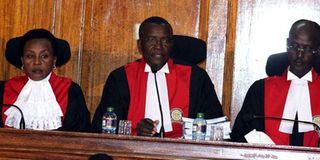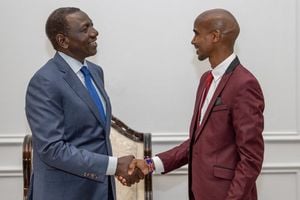CJ’s critique of 2013 case returns to the spotlight

Supreme Court judges Philomena Mwilu (left) and Chief Justice David Maraga preside over the pre-trial conference at the Supreme Court on August 26, 2017. Nasa seeks an order to audit the presidential election declaration forms. PHOTO | DENNIS ONSONGO | NATION MEDIA GROUP
What you need to know:
- In the 2013 presidential election petition, the Supreme Court ordered the re-tallying of 22 polling stations.
- He noted that scrutiny of the electoral process is anchored in both the letter and spirit of the Constitution.
Chief Justice David Maraga will be in the spotlight this week as he presides over the petition challenging President Uhuru Kenyatta’s re-election, following his previous criticism of the Supreme Court’s decision to ignore results of the court-ordered partial re-tallying of votes in 2013.
In a personal opinion that could have a bearing on Nasa’s current request for scrutiny, Justice Maraga wonders why the 2013 bench failed to consider the report in its ruling.
JURISPRUDENCE
Justice Maraga’s personal opinion was expressed as a chapter entitled “Scrutiny in Electoral Disputes: A Kenyan Judicial Perspective”, and was published in a 2016 book, “Balancing the Scales of Electoral Justice: 2013 Kenyan Election Disputes Resolution and Emerging Jurisprudence”.
“As stated, at the conclusion of the scrutiny exercise, the Registrar makes a report of his or her findings.
"Such report is taken into consideration in the determination of the petition in question,” Justice Maraga, then the chairman of the Judiciary Committee on Elections, writes.
SCRUTINY
The committee is currently chaired by High Court Judge Msagha Mbogholi.
“This however does not seem to have happened in the Raila Odinga case.
"Save for the mention of mismatches between the contents of Forms 34 and 36, which it dismissed as coming belatedly in the petitioners’ counsels’ final submissions, the Supreme Court never addressed the objective and result of court supervised scrutiny,” he says.
RE-TALLYING
A principal relief being sought by Nasa in the current petition is for an order to scrutinise the rejected and spoilt ballots, an audit of the presidential election declaration forms, as well as an audit of the technology used by IEBC in the recent election.
“A specific order for scrutiny of the rejected and spoilt votes; an order for scrutiny and audit of all returns of the presidential election, including but not limited to Forms 34A, 34B and 34C; and, an order for scrutiny and audit of the system and technology used by the 1st Respondent in the Presidential Election (IEBC), including but not limited to the Kiems kits, the server(s) and website/portal," Nasa says in its petition currently pending before the Supreme Court.
In the 2013 presidential election petition, the Supreme Court ordered the re-tallying of 22 polling stations and an audit of the final tally of the presidential results.
CRITICISM
The court eventually dismissed then Cord presidential candidate’s petition against the election of current President Kenyatta in a ruling that has since been roundly criticised by the opposition, a section of lawyers and civil society.
The country has gone full circle and the focus again is on the Supreme Court, currently headed by Chief Justice Maraga.
Like in 2013, the petitioners are former Prime Minister Raila Odinga and his running mate Kalonzo Musyoka while the respondents are the Independent Electoral and Boundaries Commission (IEBC), the commission’s chairman Wafula Chebukati, and President Kenyatta.
ERRORS
Even as he pointed out the omission by the 2013 Supreme Court bench, CJ Maraga noted that scrutiny, such as the one that has been requested by Nasa, is not an automatic right to be granted as a matter of course since “not every claim of misconduct in an election or plea in a petition warrants scrutiny”.
However, he went ahead to express personal views on the importance of scrutiny.
“Given the complex nature of Kenya’s General Election of filing six elective positions all in one day, errors especially in the counting of votes, are bound to occur from even sheer fatigue of the polling officials.
"Scrutiny accords the electoral process a golden chance of correcting such errors,” Justice Maraga argued.
GUIDELINE
He also expressed an opinion on how a request for scrutiny should be couched, stating that “irregularities or malpractices that may warrant scrutiny should be concisely pleaded in the petition and in the affidavit in support”.
The current Chief Justice added that in applying for scrutiny, “specificity is crucial” and should not be “couched in general terms”.
“The prayer for scrutiny must specify the polling station(s) in which the results are disputed and the documents which should be scrutinised.
"The party seeking scrutiny must therefore ensure that its petition and affidavit in support “contain concise statements of material facts” upon which the prayer is grounded,” Justice Maraga argues in his writing.
VOTES CAST
That notwithstanding, he noted that scrutiny of the electoral process is anchored in both the letter and spirit of the Constitution, in particular Article 38 of the Constitution, Chapter Seven of the Constitution, section 82 of the Elections Act and Rule 33 of the Election Petition Rules.
In its petition, Nasa has also sought the court to review its 2013 ruling on the matter of rejected and spoilt votes, urging the Supreme Court to make “A declaration that rejected and spoilt votes count toward the total votes cast and in the computation of the final tally of the presidential election”.
On whether or not rejected and spoilt votes should be considered in computing the final tally of presidential election results, Justice Maraga had in 2016 observed that “the issue of all the votes cast in Article 138(4) of the Constitution is far from being settled”.
As such, in the article, he had stated: “A constitutional amendment will be necessary to settle it.”





